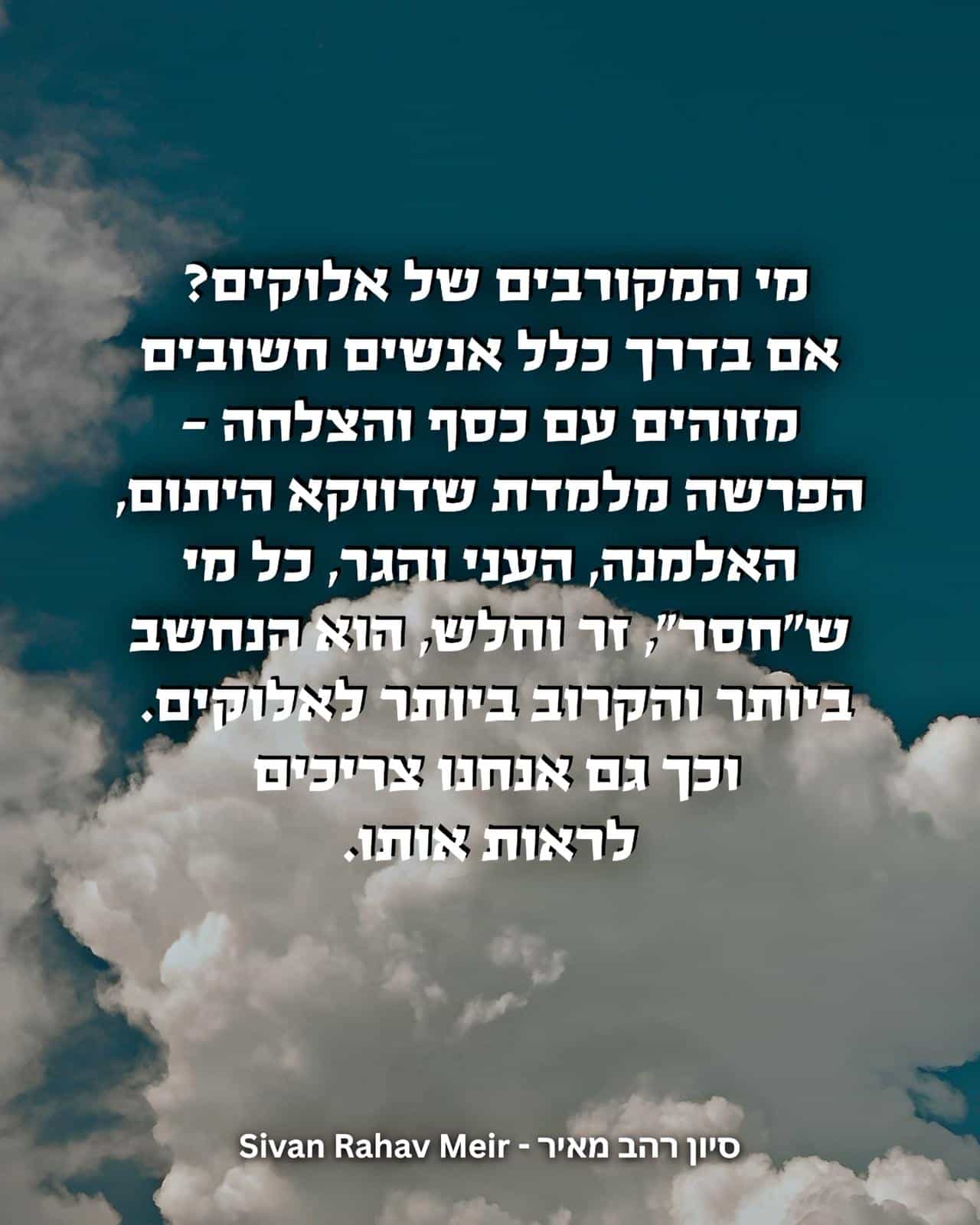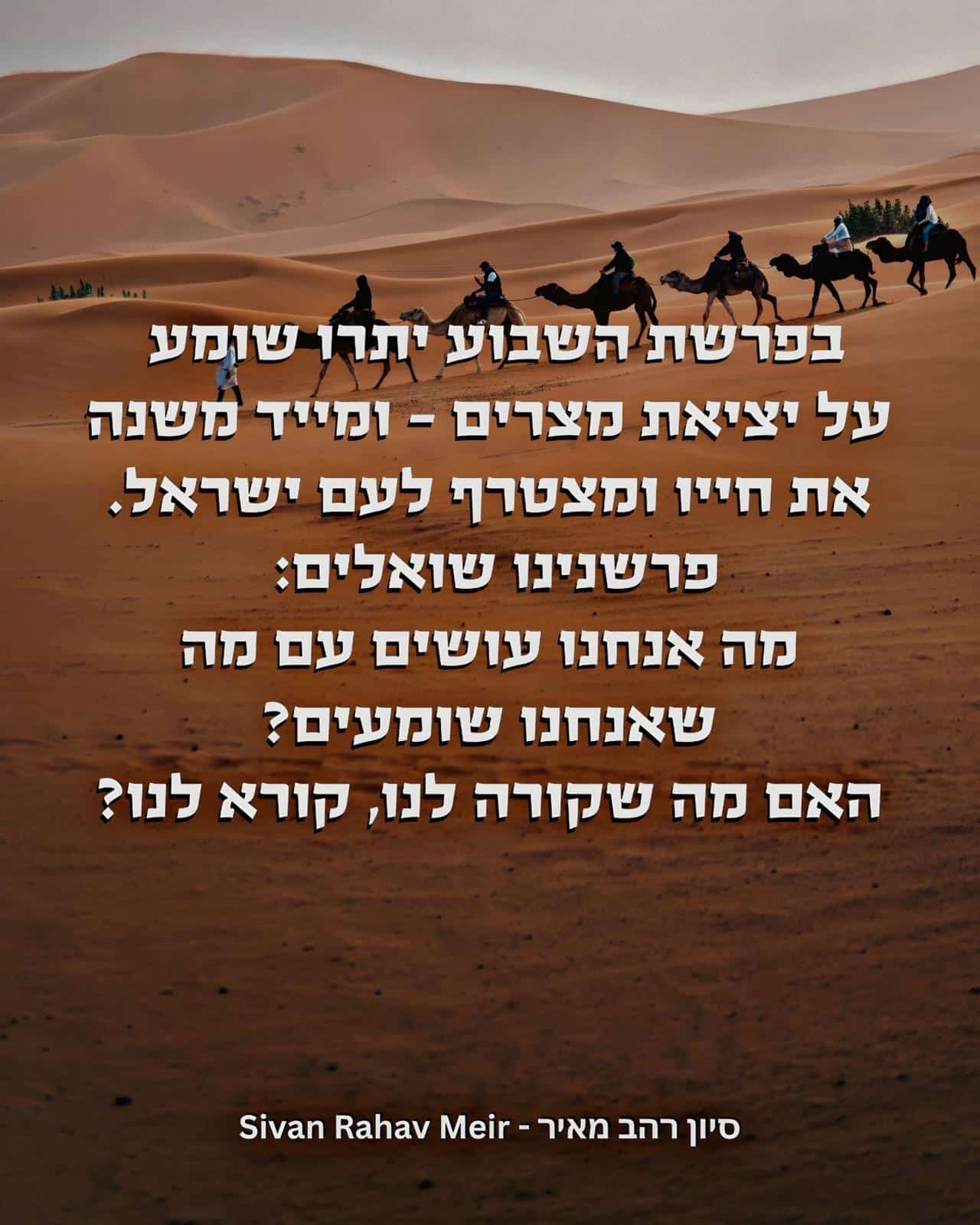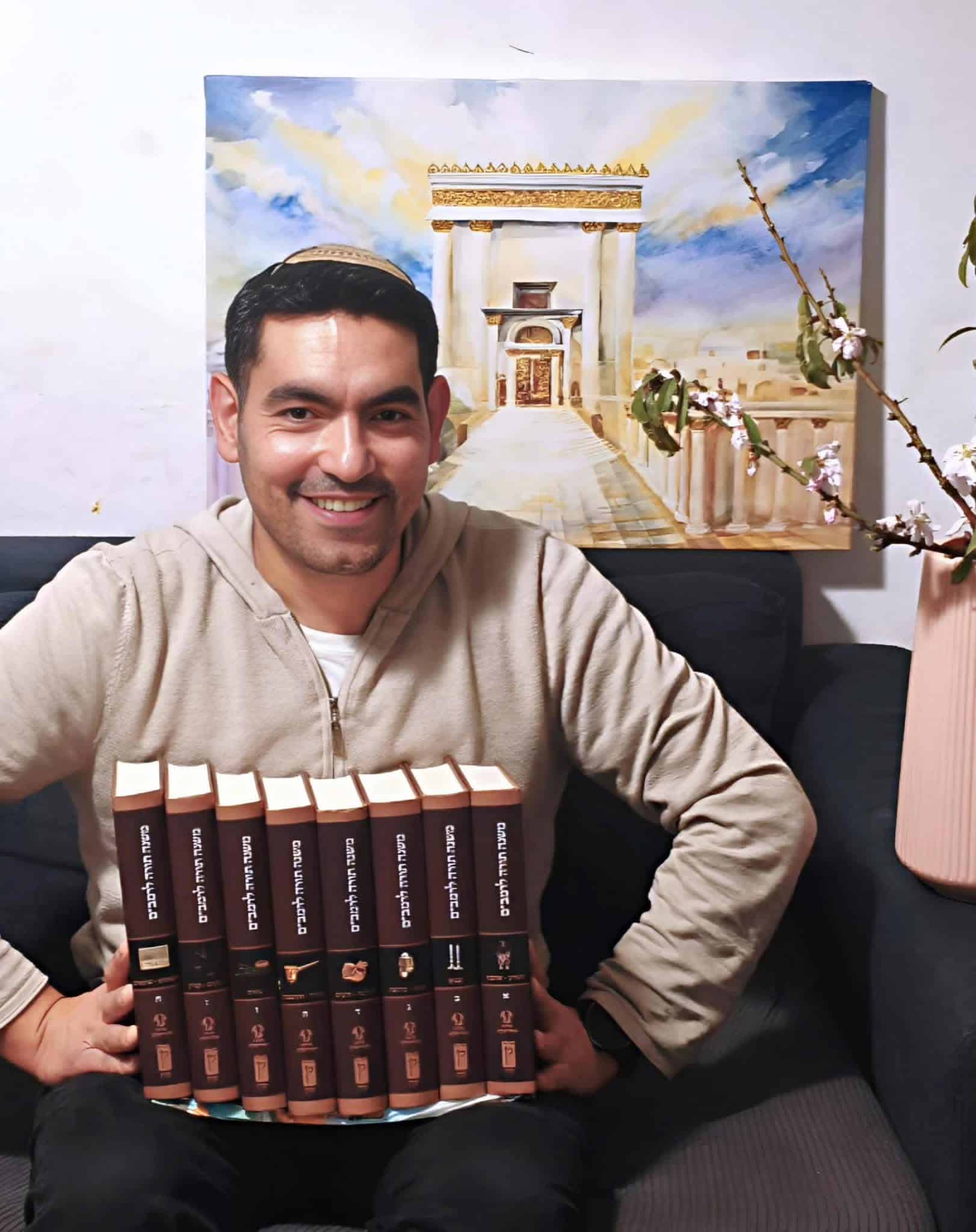Perhaps this is the “main course” in the story of Yosef: the way Yosef reassures his brothers. They do not apologize to him but, instead, he reassures them. Here, psychology can help us understand what Yosef is doing and two psychological terms will come to our assistance: “emotional intelligence” and “reframing.” These two terms perfectly explain what happens in the parasha. So what is the process that Yosef must undergo ?
Yosef reveals himself to his brothers with a perfect combination of understanding and sensitivity. The most visible characteristic of his speech is the manner in which he speaks. He simply talks and talks and does not allow a single moment of uncomfortable silence to occur. After Yosef reveals himself, you would expect that there would be long stretches of uncomfortable silence, especially after 22 years of non-communication with his brothers. But Yosef gives a speech that lasts for 11 uninterrupted verses! Here, he demonstrates profound emotional intelligence towards his brothers.
וַיֹּאמֶר יוֹסֵף אֶל אֶחָיו אֲנִי יוֹסֵף הַעוֹד אָבִי חָי וְלֹא יָכְלוּ אֶחָיו לַעֲנוֹת אֹתוֹ כִּי נִבְהֲלוּ מִפָּנָיו
וַיֹּאמֶר יוֹסֵף אֶל אֶחָיו גְּשׁוּ נָא אֵלַי וַיִּגָּשׁוּ וַיֹּאמֶר אֲנִי יוֹסֵף אֲחִיכֶם אֲשֶׁר מְכַרְתֶּם אֹתִי מִצְרָיְמָה
וְעַתָּה אַל תֵּעָצְבוּ וְאַל יִחַר בְּעֵינֵיכֶם כִּי מְכַרְתֶּם אֹתִי הֵנָּה כִּי לְמִחְיָה שְׁלָחַנִי אֱלֹהִים לִפְנֵיכֶם
כִּי זֶה שְׁנָתַיִם הָרָעָב בְּקֶרֶב הָאָרֶץ וְעוֹד חָמֵשׁ שָׁנִים אֲשֶׁר אֵין חָרִישׁ וְקָצִּיר
וַיִּשְׁלָחֵנִי אֱלֹהִים לִפְנֵיכֶם לָשׂוּם לָכֶם שְׁאֵרִית בָּאָרֶץ וּלְהַחֲיוֹת לָכֶם לִפְלֵיטָה גְּדֹלָה
וְעַתָּה לֹא אַתֶּם שְׁלַחְתֶּם אֹתִי הֵנָּה כִּי הָאֱלֹהִים וַיְשִׂימֵנִי לְאָב לְפַרְעֹה וּלְאָדוֹן לְכָל בֵּיתוֹ וּמֹשֵׁל בְּכָל אֶרֶץ מִצְרָיִם
מַהֲרוּ וַעֲלוּ אֶל אָבִי וַאֲמַרְתֶּם אֵלָיו כֹּה אָמַר בִּנְךָ יוֹסֵף שָׂמַנִי אֱלֹהִים לְאָדוֹן לְכָל מִצְרָיִם רְדָה אֵלַי אַל תַּעֲמֹד
וְיָשַׁבְתָּ בְאֶרֶץ גֹּשֶׁן וְהָיִיתָ קָרוֹב אֵלַי אַתָּה וּבָנֶיךָ וּבְנֵי בָנֶיךָ וְצֹאנְךָ וּבְקָרְךָ וְכָל אֲשֶׁר לָךְ
וְכִלְכַּלְתִּי אֹתְךָ שָׁם כִּי עוֹד חָמֵשׁ שָׁנִים רָעָב פֶּן תִּוָּרֵשׁ אַתָּה וּבֵיתְךָ וְכָל אֲשֶׁר לָךְ
וְהִנֵּה עֵינֵיכֶם רֹאוֹת וְעֵינֵי אָחִי בִנְיָמִין כִּי פִי הַמְדַבֵּר אֲלֵיכֶם
וְהִגַּדְתֶּם לְאָבִי אֶת כָּל כְּבוֹדִי בְּמִצְרַיִם וְאֵת כָּל אֲשֶׁר רְאִיתֶם וּמִהַרְתֶּם וְהוֹרַדְתֶּם אֶת אָבִי הֵנָּה
And Joseph said to his brothers, "I am Joseph. Is my father still alive?" but his brothers could not answer him because they were startled by his presence. Then Joseph said to his brothers, "Please come closer to me," and they drew closer. And he said, "I am your brother Joseph, whom you sold into Egypt. But now do not be sad, and let it not trouble you that you sold me here, for it was to preserve life that God sent me before you. For already two years of famine [have passed] in the midst of the land, and [for] another five years, there will be neither plowing nor harvest. And God sent me before you to make for you a remnant in the land, and to preserve [it] for you for a great deliverance. And now, you did not send me here, but God, and He made me a father to Pharaoh, a lord over all his household, and a ruler over the entire land of Egypt. Hasten and go up to my father, and say to him, 'So said your son, Joseph: "God has made me a lord over all the Egyptians. Come down to me, do not tarry. And you shall dwell in the land of Goshen, and you shall be near to me, you and your children and your grandchildren, and your flocks and your cattle and all that is yours. And I will sustain you there for there are still five years of famine lest you become impoverished, you and your household and all that is yours. And behold, your eyes see, as well as the eyes of my brother Benjamin, that it is my mouth speaking to you. And you shall tell my father [of] all my honor in Egypt and all that you have seen, and you shall hasten and bring my father down here." . (Genesis 45:3-13, translation at Chabad.org)
What an amazing speech - such wisdom, such restraint; such positive and loving outreach to his brothers. He smooths over rough patches, erases stains, ignores transgressions. Professor Yair Hamburger calls this a lesson in “emotional intelligence.” True, this psychological concept was popularized more than 3,500 years later but Yosef illustrates its meaning, nevertheless, in one of the oldest speeches on record. We need to understand that, until this moment, Yosef’s family conflicts had not yet been resolved, and had only led to divisions between the brothers.
Up until now, life throughout history had always been a “zero sum game” – you were either a winner or a loser -- and his brothers apparently thought that it would continue to be this way. The lucky one was chosen to be the winner and the others were losers and cast aside, whether you were talking about Cain and Abel, Yitzchak and Yishmael, or Yaakov and Esav. Therefore, this parasha is fittingly found at the end of the book of Genesis. Genesis begins with strife between brothers than ends in murder and Genesis concludes with strife between brothers that ends in reconciliation. We learn a new model for human relationships. From some classic cases, we have already learned much about conflict but now, for the first time, we learn about the ability to sew back up what has been torn and how to repair what has been damaged. In demonstrating this fantastic capacity to save everyone involved from a seemingly hopeless situation, the moniker of “Yosef HaTzadik” is highly appropriate. Yosef succeeds in extricating his brothers from a thorny entanglement and, in the process, of extricating us -- all of Am Yisrael -- from being entangled, too. How does he do this? What are we to learn from him? According to Professor Hamburger, the textbook definition of emotional intelligence consists of five components. He quotes them and explains how they apply to Yosef:
- Self-awareness: acquaintance with your strengths and weaknesses – your internal emotional makeup -- so you know how to respond in the best possible way to any situation that involves interaction with others; Yosef matures into a person who cares for others and demonstrates this through development of listening skills.
- Self-regulation: remaining calm in stressful situations, the ability to restrain yourself and delay satisfaction of immediate needs; Yosef could have easily revealed himself to his brothers earlier but delays doing so until the appropriate moment arrives.
- Channeling Emotions for a Higher Purpose; Yosef is able to channel his emotions of love and compassion into a seemingly heartless scheme (which is really an act of love) to bring his brothers to do teshuva/repentance which is achieved when they act differently towards Binyamin (Yehuda offers to be a lifetime slave in order to free Binyamin) than they had towards Yosef (when they threw him into a pit and sold him to a passing caravan).
- Empathy: Sensitivity to what others are feeling, understanding of others’ perspectives; Yosef’s reaching out to Pharaoh’s ministers while in prison, as well as seeing the world through his brothers’ eyes and not accusing them of any misdeed.
- Relationship Management: skilled use of emotional intelligence in order to build, preserve, and improve relationships; Yosef changes into a model for preserving family unity.
Professor Hamburger asks us to read the story of Yosef in the light of the emotional intelligence that he develops: he does not humiliate his brothers, he does not say “I told you so, just look, my dreams came true and you are bowing down to me” but the opposite – he chooses words of appeasement, he chooses lasting family unity over a fleeting victory for his ego, he quells their anxiety, and allays their suspicions. In terms of the news of day, Yosef is transformed from a slave to someone who, in terms of his power, is second only to Pharaoh. We can imagine the headline: “Poor Child Almost Buried in Snake Pit Becomes Most Powerful Man on Earth.” But on a deeper level, he changed from a youth caught up in his dreams of ruling over others into a man who exercises the power of a true ruler – somone who rules over himself, over his own emotional world. Such a ruler is able not only to rule over his own emotions but to positively influence the emotional world of others and, in so doing, sew up past wounds and bring peace. “Yosef’s personal story is the challenge faced by every one of us,” Professor Hamburger concludes. Every person can look at his own life and examine his status in terms of facing and resolving conflicts in the manner of Yosef. This reminds me of the correspondence between the Lubavitcher Rebbe and Professor Velvl Greene, a scientist. The professor asked numerous questions concerning Torah and science and the Rebbe answered by bringing him closer to Judaism. After many years, when the professor returned to Judaism, the Rebbe told him as follows: “My task is not to win arguments but to bring Jews closer to Judaism.” The task of Yosef, of the Lubavitcher Rebbe, and of all of us, too, is not to win arguments but to engender love for Torah and mitzvot.
But there’s another dimension here. If we delve a bit deeper into our psychological examination of this story, we can add another concept – courtesy of Rabbi Jonathan Sacks. Emotional intelligence is fine looking outwards, toward his brothers, but what is actually happening in the heart of Yosef himself? Here, Rabbi Sacks introduces the concept of reframing and states an ironclad rule: “If we can change our way of thinking – we can change our feelings, too.”
In the Chasidic book of “Tanya” this rule is expressed as “the mind rules the heart,” which is not just a slogan but a demand by which to live. In the Zohar it is written that the behavior of Yosef is meant to instruct all the generations that come after him.
In this regard, however, there is another important aspect to the story that we can easily overlook and that’s how we tell the story itself. We have the choice to focus either on the twists and turns of the plot as it affects the characters involved as a strictly human drama or to see G-d as the force behind everything that happens.
To reframe this story with a new commentary starts with Yosef, history’s first reframer. Here he was sold into slavery and without freedom for many years, cut off from his family. It would have been completely understandable and excusable for him to bear a grudge, to be angry, to desire to take revenge and humiliate his brothers. But he rose above these feelings and channeled them otherwise, reframing them in a most exalted way. Notice again the words of reconciliation that Yosef offers to his brothers, how he reframes everything in a most wonderful way:
וְעַתָּה אַל תֵּעָצְבוּ וְאַל יִחַר בְּעֵינֵיכֶם כִּי מְכַרְתֶּם אֹתִי הֵנָּה כִּי לְמִחְיָה שְׁלָחַנִי אֱלֹהִים לִפְנֵיכֶם
וַיִּשְׁלָחֵנִי אֱלֹהִים לִפְנֵיכֶם לָשׂוּם לָכֶם שְׁאֵרִית בָּאָרֶץ וּלְהַחֲיוֹת לָכֶם לִפְלֵיטָה גְּדֹלָה
וְעַתָּה לֹא אַתֶּם שְׁלַחְתֶּם אֹתִי הֵנָּה כִּי הָאֱלֹהִים וַיְשִׂימֵנִי לְאָב לְפַרְעֹה וּלְאָדוֹן לְכָל בֵּיתוֹ וּמֹשֵׁל בְּכָל אֶרֶץ מִצְרָיִם
מַהֲרוּ וַעֲלוּ אֶל אָבִי וַאֲמַרְתֶּם אֵלָיו כֹּה אָמַר בִּנְךָ יוֹסֵף שָׂמַנִי אֱלֹהִים לְאָדוֹן לְכָל מִצְרָיִם רְדָה אֵלַי אַל תַּעֲמֹד
But now do not be sad, and let it not trouble you that you sold me here, for it was to preserve life that God sent me before you. . . And God sent me before you to make for you a remnant in the land, and to preserve [it] for you for a great deliverance. And now, you did not send me here, but God, and He made me a father to Pharaoh, a lord over all his household, and a ruler over the entire land of Egypt. Hasten and go up to my father, and say to him, 'So said your son, Joseph: "God has made me a lord over all the Egyptians. Come down to me, do not tarry. (Genesis 45: 3, 5-7)
“God” is mentioned four times. It’s not them, the brothers, who are responsible, but G-d. G-d sent Yosef on a mission to save lives. The brothers are only a tool, they are not the main thing. Everything that happened to Yosef was of critical importance, in order that he would save all of Egypt from starvation as well as the members of his own family, who would find a safe harbor and a secure dwelling place under his watchful eye.
Reframing makes it possible to forgive and to be reconciled with each other. It’s an “exchange” of bad energy for good energy, a transition from obsessive preoccupation with a gloomy past to preoccupation with a bright future. Rabbi Sacks summarizes as follows with a message for all of us:
“We cannot change the past, but by changing the way we think about the past – we can change the future.”
It’s our decision how we wish to look at reality and describe it to ourselves, either negatively or positively. Yosef teaches us the meaning of true greatness and nobility. Rav Shlomo Wolbe expresses this as follows: “The most difficult work a person can undertake is character refinement. To be ultimately as unblemished as Yosef (and perhaps this is how the highest degree of kashrut certification -- “unblemished house of Yosef” – came to be called by that name), to where not a hint of hatred towards his brothers, of holding them accountable in any way, remained. And for Yosef to show his brothers that he truly loves them, this is not at all simple.”
And the one who brings us to an even greater depth of understanding is the Lubavitcher Rebbe. It’s not only a matter of how we relate to people but of how G-d relates to us. Our headline to this story is “How to Contend with Human Evil.” All of us, at one time or another, encounter situations that are just “not fair,” in which we feel that others treated us badly (not as badly as Yosef, but still we feel frustration and lingering bitterness. You failed, you were let go from your job, they expelled you from school – how do you respond to this?) Notice what the Lubavitcher Rebbe has to say in this regard: “They sold him into slavery and yet he satisfied their every need to the end of their days. He forgave them not only because he merited to develop great self-control, but he also merited to learn the secret of contending with human evil – he understood that his being sold was part of the divine plan and focused on the positive final consequence of that event (his transformation to viceroy of Egypt) instead of focusing on the negative motive behind it. The power behind forgiving behavior that is possessed by every Jew, to repay bad with good – comes from Yosef. As it is written in the book of ‘Tanya’: “And not to repay (someone who treated you unfairly) in kind, heaven forbid, but on the contrary – to learn from Yosef and his brothers and to repay offenders with favors.” And we even pray to G-d that He will behave towards us as Yosef behaved towards his brothers – that He will regard our actions as links in a chain that lead to a favorable outcome for the world, and that He will forgive all the impure, negative motives that are mixed in with what we do. In order to ‘awaken’ a relationship of this kind from HaShem towards us, we need to act in a similar manner: to look upon another’s sins favorably and, more than this, to utilize the bad that we see as an impetus for self-improvement and to turn our liabilities into merits.”
Yosef does not cease to surprise and educate us. After he carefully designs a complex test to see if his brothers have truly changed, he does not cease to rise above himself. He no longer owes them anything but he goes above and beyond in taking care of them. And we must forever act like Yosef since this is “the secret for contending with human evil.” Someone treated me badly? Not to obsess about it, but rather, instead, to do good. This is the best road to take and it is important to note that this is also the best road to take with the Holy One Blessed be He. If we behave in this way towards him, so he will also behave towards us, and we certainly need for him to ignore the negativity and impurity in us.
Yosef attached himself to this attitude, especially with his words, which were always positive, inclusive, optimistic, and full of faith. These words reframed events by putting a positive spin on all the bad that happened to him. How much we could use such healing words today.









